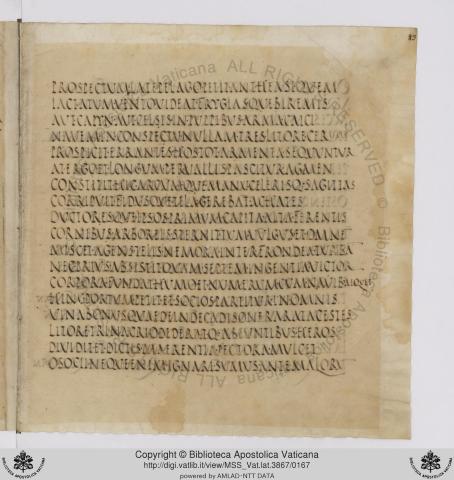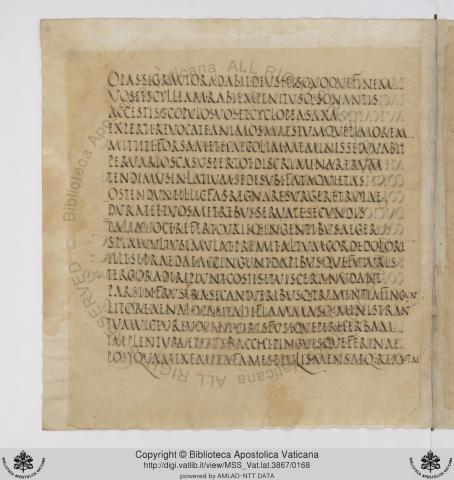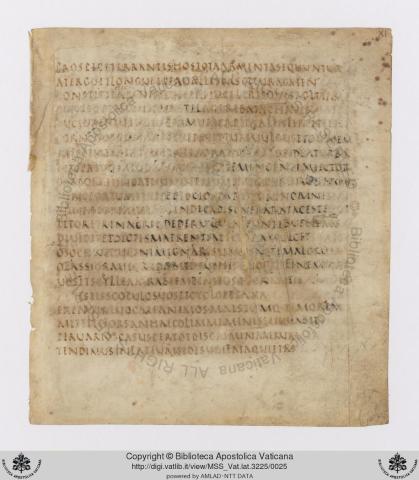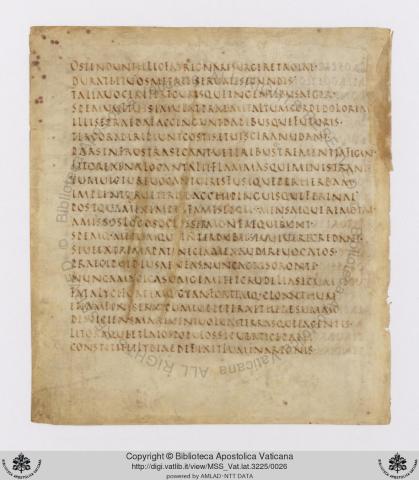CORE VOCABULARY
ō: (interj. expressing joy, grief, astonishment, desire, or indignation), O! oh! ah! w. voc., 2.281, et al.; w. sī and the subj., oh that, 11.415; sometimes placed after the word to which it relates, 2.281.
ignārus, a, um: (adj.), not knowing; freq.; unaware, ignorant, 11.154; often w. genit., ignorant of, 1.630; unsuspicious of, 2.106; unconscious, 9.345; not knowing the land; (pass.), unknown, a stranger, 10.706.
malum, ī, n.: an evil, a misfortune, calamity, adversity; suffering, woe, misery, 1.198; misdeed, crime, sin, wickedness, 6.739; pest, curse, scourge, 4.174; mischief, poison, 7.375.
Scyllaeus, a, um: adj. (Scylla), pertaining to Scylla; Scyllaean, 1.200.
rabiēs, em, ē, f.: madness, frenzy, fury, fierceness, 2.357, et al.; of inanimate things, 5.802, et al.
penitus: adv. (cf. penes), inwardly, far within, deep, deeply, 1.200; wholly, entirely, 6.737; afar, 11.623; far away, 1.512.
sonāns, antis: sounding, resounding, murmuring, rustling, rattling, freq. (sonō)
accēdō, cessī, cessus (perf. ind., accēstis for accessistis, 1.201), 3, n.: to go or draw near to; approach, with acc. alone, 1.307. (ad and cedo)
scopulus, ī, m.: a projecting ledge of rock; a high cliff or rock, 1.180; crag, 1.45; ledge, reef, 1.145; detached rock, fragment of rock, 12.531.
Cyclōpius, a, um: adj. (Cyclōps), pertaining to the Cyclops; Cyclopean, 1.201.
forsan: (adv.), perhaps, 1.203. (for forsitan)
meminī, isse, def. a. and n.: (w. acc., gen., or inf.), to have in mind; remember, be mindful, recollect, 1.203; distinguish, 3.202. (rel. to mēns)
discrīmen, inis, n.: a separating interval, space, 5.154; separation, division, 10.382; distance, 3.685; difference, distinction, 1.574; variation, division, of sound; note, 6.646; crisis, danger, peril, 1.204; pl., difference, 10.529. (discernō)
Latium, iī, n.: a country of ancient Italy, extending from the left bank of the lower Tiber to Campania, 1.6; (meton.), for Latīnī, the Latins, people of Latium, 10.365, et al. (2. latus; Virgil, 8.323, derives it from lateō)
quiēscō, quiēvī, quiētus, 3, n.: to rest, 7.6; repose, rest in death, 1.249; be hushed, still, quiet, 4.523; cease from action, 5.784; lie, 10.836; p., quiētus, a, um, at rest, quiet, 5.848; still, calm, tranquil, 5.216; peaceful, in repose, 4.379; gentle, friendly, 1.303. (quiēs)
fās, indecl. n.: divine right or law; duty, justice, 3.55; privilege, 9.96; as predicate with esse, permitted, lawful, proper, incumbent, 1.77, et al. (rel. to for)
resurgō, surrēxī, surrēctus, 3, n.: to rise again, 1.206; revive, return, 4.531.
Trōia, ae, f.: 1. Troy, the capital of the Troad, 2.625, et al. 2. A city built by Helenus in Epirus, 3.349. 3. A part of the city of Acesta in Sicily, 5.756. 4. The name of an equestrian game of Roman boys, 5.602.
dūrō, āvī, ātus, 1, a. and n.: to make hard, harden; to be enduring; endure, persevere; be firm, patient, bear up, 1.207; continue, last. (dūrus)




